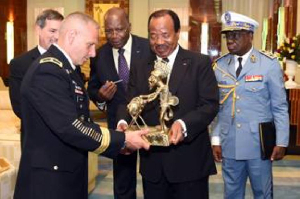Gender equality is a human right, but our world faces a persistent gap in access to opportunities and decision-making power for women and men. Globally, women have fewer opportunities for economic participation than men, less access to basic and higher education, greater health and safety risks, and less political representation.
Guaranteeing the rights of women and giving them opportunities to reach their full potential is critical not only for attaining gender equality, but also for meeting a wide range of international development goals. Empowered women and girls contribute to the health and productivity of their families, communities, and countries, creating a ripple effect that benefits everyone.
It saddens my heart why the United Nation, European Union, African union and the ECOWAS is quite on the kidnapped of over 200 hundred innocent girls in Nigeria by a notorious terrorist group called Boko Haram. If indeed the world believes in feminist agenda then a lot more needs to be done to rescue these innocent girls.
Empowering woman is the best way of securing a good future in the 21st century and also eradicate conflicts and violent against woman, promote peace building and ensures national development.
Women's empowerment is a critical aspect of achieving gender equality. It includes increasing a woman's sense of self-worth, her decision-making power, her access to opportunities and resources, her power and control over her own life inside and outside the home, and her ability to effect change. Yet gender issues are not focused on women alone, but on the relationship between men and women in society. The actions and attitudes of men and boys play an essential role in achieving gender equality.
Education is a key area of focus. Although the world is making progress in achieving gender parity in education, girls still make up a higher percentage of out-of-school children than boys. Approximately one quarter of girls in the developing world do not attend school. Typically, families with limited means who cannot afford costs such as school fees, uniforms, and supplies for all of their children will prioritize education for their sons. Families may also rely on girls' labor for household chores, carrying water, and childcare, leaving limited time for schooling. But prioritizing girls' education provides perhaps the single highest return on investment in the developing world.
Many of you must have heard that, "If you educate a man, you educate an individual, but, if you educate a woman, you educate a family." I deeply share my sentiment to this quote. It’s the women who manage the usual households and the children. Every kid is the future of the nation and if their mother doesn't even know the basics, the kid's education and future is not only affected but so is the future of the country. Education is important for everyone, but it is especially significant for girls and women.
This is true not only because education is an entry point to other opportunities, but also because the educational achievements of women can have ripple effects within the family and across generations. Investing in girls' education is one of the most effective ways to reduce poverty.
An educated girl is more likely to postpone marriage, raise a smaller family, have healthier children, and send her own children to school. She has more opportunities to earn an income and to participate in political processes, and she is less likely to become infected with HIV. Though women comprise more than 50% of the world's population, they only own 1% of the world's wealth. Throughout the world, women and girls perform long hours of unpaid domestic work. In some places, women still lack rights to own land or to inherit property, obtain access to credit, earn income, or to move up in their workplace, free from job discrimination. At all levels, including at home and in the public arena, women are widely underrepresented as decision-makers.
In legislatures around the world, women are outnumbered 4 to 1, yet women's political
participation is crucial for achieving gender equality and genuine democracy. This year theme for the 24th AU summit sounds interesting (Year of Women’s Empowerment and Development towards Africa’s Agenda 2063). In achieving this goal calls for self-dedication and collaborative activism by African leaders and its citizens.
It’s time for us to put our thought into actions and fight for the right of these innocent ones (woman). Domestic violence against woman must be a thing of the past in our African Continent rather than becoming rampant in our society today.
Promoting gender equality and empowering woman as the third goal set by the United Nation needs to be taken a second look by world leaders, especially Africans and restructure their policy frame work in ensuring these goals are achieved. Woman deserve equal right as man in our societies and they need to be considered in our decision making process.
By Nana Yaw Acheampong (Youth Activist) Email: acheampongdaniel76@yahoo.com.
Opinions of Tuesday, 10 March 2015
Auteur: Nana Yaw Acheampong















